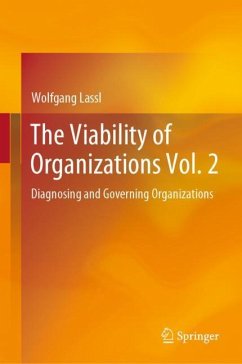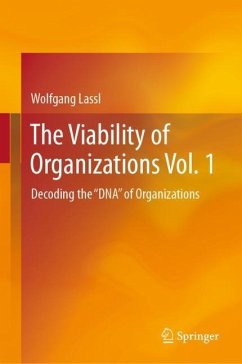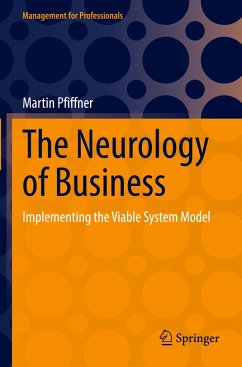
The Viability of Organizations Vol. 3
Designing and Changing Organizations
Versandkostenfrei!
Versandfertig in 6-10 Tagen
61,99 €
inkl. MwSt.
Weitere Ausgaben:

PAYBACK Punkte
31 °P sammeln!
The design process for organizational structures sometimes resembles a random walk, especially when it is embedded in an arena of competing personal interests and power games. Many organizations still lack clear guidance and are therefore seeking a rigorous, nuanced, and impartial methodology for the design and development of their organizational structures, processes and behavioral repertoire. The Viable System Model (VSM) can help: by identifying the essential design principles and parameters that need to be considered, and which can be used to enhance an organization's effectiveness, adapta...
The design process for organizational structures sometimes resembles a random walk, especially when it is embedded in an arena of competing personal interests and power games. Many organizations still lack clear guidance and are therefore seeking a rigorous, nuanced, and impartial methodology for the design and development of their organizational structures, processes and behavioral repertoire. The Viable System Model (VSM) can help: by identifying the essential design principles and parameters that need to be considered, and which can be used to enhance an organization's effectiveness, adaptability, cohesion and overall viability.
This book, the third volume in a set of three, connects the VSM to the world of the standard organizational chart. It offers readers a new perspective on corporate functions and their contributions to the organization as a whole. Further, it shows them how the VSM can be used to develop viable organizational structures, following a detailed step-by-step approach. Lastly, it explains the vital processes, behaviors, and attitudes that need to be developed in order to make organizations truly viable.
Readers will find solutions to, and guidelines on, many critical organizational design issues, e.g. designing job profiles; correctly mapping synergistically ("centrally") operating units in the organizational chart; outsourcing processes; and handling matrix situations; as well as designing and implementing organizational change processes.
"This compendium is a most welcome contribution to Organizational Cybernetics. Lassl provides a detailed analytical and insightful perspective on the currently most powerful organization theory, which is a key to mastering complexity: the Viable System Model. The author also finds new, creative ways of showing the practitioner how to make the model work. If you apply it properly, you can reap huge benefits: the viability of your organization and a prosperous future."Prof. em. Dr. Markus Schwaninger, University of St. Gallen
"There is nothing more practical than a good theory" (K. Lewin). This is exactly what Lassl's books exemplify and prove. By advancing the VSM-based organizational theory and providing ample application-related examples, these books allow the readers to look at their organizations and management from a new perspective, and provides them with the knowledge to trigger and implement practical organizational changes.I have been able to draw upon many cutting-edge examples from Lassl's books for my lectures on the VSM, which have repeatedly convinced students of its value and enabled them to gain an in-depth understanding of the VSM. Particularly Lassl's elaborations on variety management and on the axiom of requisite vertical eigen-variety are cornerstones for every organizational design project, for value-oriented management, and for the overall viability of the organization. I highly recommend the book to all managers looking for ideas for future-oriented design of organizations and of value creation."Prof. Dr. Matthias Müller-Wiegand, Vice President Department Business and Law, Rheinische Fachhochschule Köln/University of Applied Sciences
This book, the third volume in a set of three, connects the VSM to the world of the standard organizational chart. It offers readers a new perspective on corporate functions and their contributions to the organization as a whole. Further, it shows them how the VSM can be used to develop viable organizational structures, following a detailed step-by-step approach. Lastly, it explains the vital processes, behaviors, and attitudes that need to be developed in order to make organizations truly viable.
Readers will find solutions to, and guidelines on, many critical organizational design issues, e.g. designing job profiles; correctly mapping synergistically ("centrally") operating units in the organizational chart; outsourcing processes; and handling matrix situations; as well as designing and implementing organizational change processes.
"This compendium is a most welcome contribution to Organizational Cybernetics. Lassl provides a detailed analytical and insightful perspective on the currently most powerful organization theory, which is a key to mastering complexity: the Viable System Model. The author also finds new, creative ways of showing the practitioner how to make the model work. If you apply it properly, you can reap huge benefits: the viability of your organization and a prosperous future."Prof. em. Dr. Markus Schwaninger, University of St. Gallen
"There is nothing more practical than a good theory" (K. Lewin). This is exactly what Lassl's books exemplify and prove. By advancing the VSM-based organizational theory and providing ample application-related examples, these books allow the readers to look at their organizations and management from a new perspective, and provides them with the knowledge to trigger and implement practical organizational changes.I have been able to draw upon many cutting-edge examples from Lassl's books for my lectures on the VSM, which have repeatedly convinced students of its value and enabled them to gain an in-depth understanding of the VSM. Particularly Lassl's elaborations on variety management and on the axiom of requisite vertical eigen-variety are cornerstones for every organizational design project, for value-oriented management, and for the overall viability of the organization. I highly recommend the book to all managers looking for ideas for future-oriented design of organizations and of value creation."Prof. Dr. Matthias Müller-Wiegand, Vice President Department Business and Law, Rheinische Fachhochschule Köln/University of Applied Sciences












